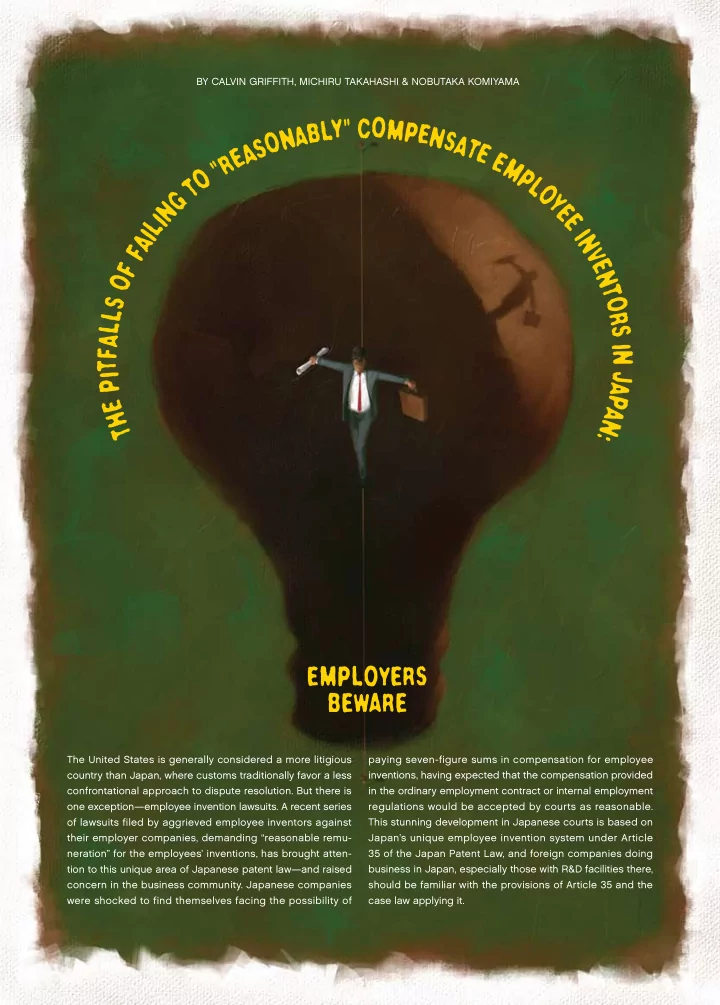

14 inventions, having expected that the compensation provided The United States is generally considered a more litigious By CALVIN GRIFFITH, MICHIRU TAKAHASHI & NOBUTAKA KOMIyAMA case law applying it. business in Japan, especially those with R&D facilities there, 35 of the Japan Patent Law, and foreign companies doing Japan’s unique employee invention system under Article This stunning development in Japanese courts is based on regulations would be accepted by courts as reasonable. in the ordinary employment contract or internal employment should be familiar with the provisions of Article 35 and the paying seven-figure sums in compensation for employee concern in the business community. Japanese companies tion to this unique area of Japanese patent law—and raised neration” for the employees’ inventions, has brought atten- their employer companies, demanding “reasonable remu- of lawsuits filed by aggrieved employee inventors against one exception—employee invention lawsuits. A recent series confrontational approach to dispute resolution. But there is country than Japan, where customs traditionally favor a less were shocked to find themselves facing the possibility of " C o l y m p b e a n n s o a s t a e e E r m " p o l t o g y n e i e l i I a n F v e f n o t s o l r l s a i f n t J i p a p e a h N T : EmployErs BEwarE
15 should be 2.5 million yen (approximately $22,000) and The Olympus case thus established that an employee inven- actual value. amount that ought to be paid for the invention based on its ulations, the employee is entitled to demand a reasonable employee receives payment pursuant to such internal reg- remuneration to be paid to employee inventors, and the even if there is an employment regulation concerning the ordered Olympus to pay the balance. The Court held that the reasonable amount of remuneration under Article 35 tion if the amount actually received under the employer’s The Supreme Court affirmed the trial court’s decision that payment—a total of slightly more than $1,800. yen for the patent grant, and 200,000 yen as a later bonus in the amount of 3,000 yen for the patent application, 8,000 yen. The employee inventor, Tanaka, received remuneration in Japan, resulting in a royalty income of many billions of the patent as part of a patent portfolio to many licensees ent on employee Tanaka’s invention. Olympus then licensed tor has a right to claim additional remuneration for an inven- regulations is unreasonable—less than what ought to be be entitled to remuneration based on income from the pat- this issue. inventions was assigned to Hitachi, and Hitachi obtained tiff under which the right to obtain patents concerning these disks. Hitachi had entered into an agreement with the plain- ment related to the recording of digital data on optical had made many inventions during the course of his employ- Facts. The plaintiff in Hitachi was a former employee who Also BE consIDErED UnDEr ArtIclE 35? shoUlD ForEIgn coUntErPArt PAtEnts in Hitachi vs. Yonezawa (1951 Hanrei Jiho 35) finally resolved paid. As a result, many lawsuits followed, including actions from a Japanese patent. The 2006 Supreme Court decision Article 35 applies to foreign counterpart patents deriving under Article 35. One such unresolved issue was whether as to how reasonable remuneration should be determined case, however, left many issues unresolved, particularly 840 million yen (approximately $7.3 million). The Olympus in the Nichia case successfully obtained an award of around cases were quite high—for example, the employee inventor against Hitachi, Nichia, and Ajinomoto. Awards in several ents. Pursuant to those regulations, Olympus acquired a pat- ployees’ inventions and that employee inventors would orIgIn oF thE FUss—ArtIclE 35 AnD thE olyMPUs cAsE to obtain a patent on the invention originally belongs to the employee invention shall be assigned to the employer, or viding in advance that the right to obtain a patent for any employee or establish internal employment regulations pro- An employer, however, may enter into a contract with an inventions originally belongs to the employer. France, where the right to obtain patents for employee the practice in countries such as the United Kingdom and employee (Article 35, Paragraph 1). This is different from duties for the employer (an “employee invention”), the right be granted to the employer (established construction deriv- ployee’s employer and was achieved by acts within the em of the invention, falls within the scope of the business of his First, if an employee makes an invention that, by the nature employee inventors. Law. That article provides a number of important rights for employee invention system under Article 35 of the Patent Article 35 of the Japan Patent law. Japan has a unique that an exclusive license for any employee invention shall ing from Article 35, Paragraph 2). em quently around just a few hundred dollars. The Olympus lations providing that it had the right to obtain patents for regulations. In that case, Olympus had employment regu- payment had been provided for in internal employment for deficient remuneration for their inventions even when gave employee inventors clear grounds to assert claims decision in Olympus Optical v. Tanaka (1822 Hanrei Jiho 39) the Olympus case. The 2003 Japanese Supreme Court case changed the landscape. in those employment regulations was usually not high, fre- If an employer acquires the right to obtain patents for valid and binding. The amount of remuneration provided amount would be duly respected by Japanese courts as for the assignment of inventions from employees, such tion rules that set an amount of remuneration in exchange that if they unilaterally established internal employee inven- Prior to the Olympus case, Japanese companies believed Paragraph 3). pay a reasonable remuneration to the employee (Article 35, employee inventions from an employee, the employer must patent rights in Japan and abroad. In consideration of this
Recommend
More recommend